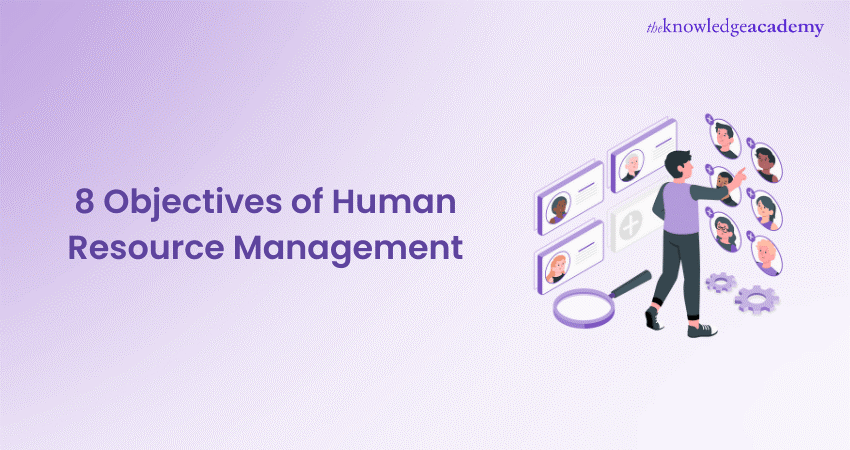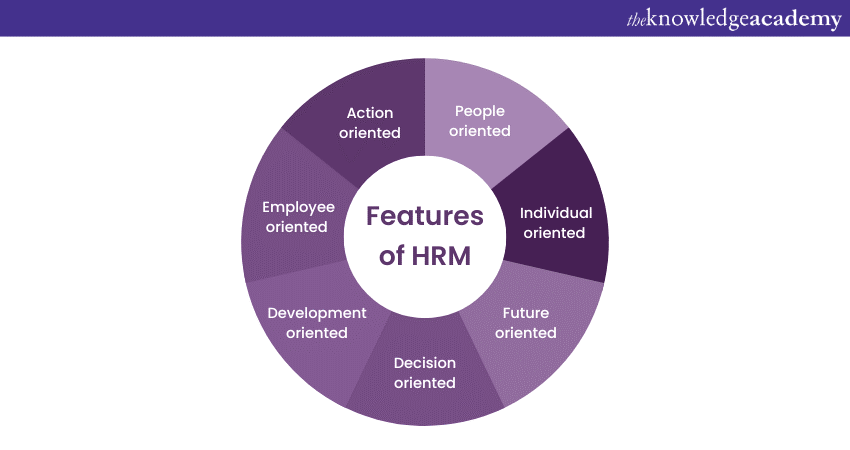We may not have the course you’re looking for. If you enquire or give us a call on + 1-866 272 8822 and speak to our training experts, we may still be able to help with your training requirements.
Training Outcomes Within Your Budget!
We ensure quality, budget-alignment, and timely delivery by our expert instructors.

In any organisation, the Human Resource Management (HRM) professionals play a vital role in Employee Engagement, growth and skill development. But what guides these professionals to ensure that employees remain motivated and loyal to the organisation? This is why it’s crucial to set up Objectives of Human Resource Management.
HRM has various objectives, such as developing leaders, fostering a positive work culture, and keeping employees. HRM also aligns employee and organisational goals, boosts engagement, and improves productivity. This blog will explain the Objectives of Human Resource Management that can help you engage and retain your employees, comply with the law, and achieve organisational success. So, let’s delve in to learn more!
Table of Contents
1) What is Human Resource Management (HRM)?
2) What are the Objectives of Human Resource Management?
a) Organisational objectives
b) Positive workplace environment
c) Effective Team coordination
d) Promoting learning and growth
e) Boosting employee motivation
f) Empowering employees with ESS
g) Data and compliance management
h) Employee retention
3) Tips for creating better Human Resource Management Objectives
4) Conclusion
What is Human Resource Management (HRM)?
Human Resource Management can be defined as the process of recruiting, retaining, improving and maintaining employees in an organisation. This department is responsible for maintaining a positive work environment and overseeing whether ethical procedures are followed in the organisation.
The HRM professionals are also responsible for approving appraisals and motivating the employees to continually continue to give optimum efficiency in their work. They advise employees and the management to maintain a professional environment and oversee if proper communication is taking place in the organisation. A good HRM professional encourages employees to focus on both their professional and personal development.

What are the Objectives of Human Resource Management?
When it comes to setting goals within an organisation, different levels of objectives need to be considered. These include societal, organisational, functional, personal objectives, etc.Each level serves a specific purpose and contributes to the organisation’s overall success. Let's explore each of these Objectives of Human Resource Management in more detail:
Organisational objectives
The main Objective of HRM is to use Human Resources effectively to meet organisational goals and standards. HRM plays a vital role in increasing the organisation’s profitability by achieving its goals. HRM involves dealing with various aspects of workforce management, such as recruitment, training, payroll, and engagement.
To do this successfully, HR professionals need to plan and execute well. HR professionals also need to have a clear vision of their goals, mission, and resources. Otherwise, effective HRM will not take place. HRM has some other objectives that are discussed below in greater detail:
Positive workplace environment
Creating a positive work culture is important for effective HRM and business performance. HR managers should actively implement strategies to foster a better work environment. Additionally, automation of tasks like leave approvals and reimbursement requests can streamline operations. Empowering employees and ensuring quick processes contribute to a positive workplace atmosphere. Building healthy and transparent relationships among team members strengthens work culture.
Implementing an effective employee management system can simplify HR tasks. Such as efficient onboarding processes that contribute to a positive workplace environment. It focuses on the following three aspects of employee communication:
a) Interaction
b) Communication
c) Collaboration

Effective team coordination
A key Objective of HRM is to promote effective team coordination within an organisation. HR Managers should ensure the availability of tools that facilitate seamless integration among team members. Smooth communication and collaboration are essential for productivity. To enhance human capital management, it is important to explore integration portals that make data easily accessible.
Functional objectives such as team integration aim to streamline operations and tasks. Implementing the right tool such as a self-service portal, can bridge the gap between employees and HR personnel, fostering closer connections. It focuses on creating a sense of unity among employees to encourage efficiency in achieving goals.
Master the HR Advisor role with our Certified HR Advisor course. - register now for in-depth training and acquire practical skills.
Promoting learning and growth
Providing learning and growth opportunities in the form of training and development for the employees, play a pivotal role in ensuring an effective and high-performing workforce. By providing appropriate training and providing opportunities, employees feel supported and organised. Training practices are vital for successful employee onboarding and performance management. However, challenges may arise in terms of planning, scheduling, and evaluating training sessions for each employee.
Thus, training management software can be used to simplify tasks such as automated reminders, easy scheduling, reporting, and tracking capabilities. With the help of these solutions, HR Managers can ensure effective training practices within the organisation. Training enhances employees' skills, knowledge, and competencies, leading to improved performance and consistent growth.
Boosting employee motivation
Employee motivation drives individuals to perform their best at work. It involves understanding and addressing employees' needs, desires, and aspirations to keep them engaged and committed.
HR professionals can empower employees by seeking their input and involving them in decision-making processes. Regular communication and engagement help in maintaining high morale of employees. Moreover, employee recognition through yearly appraisals, incentives, and performance-based bonuses can further drive motivation.
Implementing an automated feedback system for performance appraisal management keeps employees motivated and enhances productivity. Employees who feel satisfied and fulfilled are more likely to achieve targets and contribute to overall productivity.
You can drive motivation among employees while ensuring the following:
a) Employee recognition
b) Automated performance
c) Targeted rewards
d) Team building activities
e) Work-life balance
Empowering employees with ESS
Empowering employees through tools like Employee Self-Service (ESS) portal boosts motivation and saves HR efforts. The ESS portal enables employees to apply for approvals and track them via mobile phones. It provides easy access to leave requests, payslips, Provident Fund (PF) accounts, remaining leaves, upcoming holidays, manager details, and more, reducing the need for HR intervention.
Aligning HRM Objectives with individual interests encourages employees and increases workforce engagement. Effective HRM measures, including easy employee management tips, can further support workforce empowerment. Workforce empowerment involves presenting employees the authority, autonomy, and responsibility to make decisions and take ownership of their work. This helps create a sense of value and control.
Data and compliance management
Data and compliance management ensures that organisations collect, manage, and protect data as per legal and regulatory requirements, thereby safeguarding data privacy. Consolidating both company and employee data in adherence to compliance is crucial for HRM. Payroll compliance is particularly challenging, as errors can lead to penalties and damage the company's reputation. HR professionals should therefore adhere to laws and regulations to avoid unnecessary claims and facilitate smooth operations. Automated software, such as an HRMS system, can help minimise errors and eliminate the risk of penalties from regulatory bodies.
Employee retention
One of the key Objectives of Human Resource Management is the retention of employees.
Employee retention should be prioritised for HRM, and aligning functional objectives with employee interests. This can foster staff engagement in achieving the company’s goals. Retaining employees for the long-term poses a significant challenge, as some may leave shortly after onboarding due to ineffective training or a rough hiring process. Attending to employees’ experiences is crucial for maintaining low turnover rates. HR Managers should focus on learning and implementing effective retention tips to create a stable and engaged workforce.
Enhance your training and development skills with our Certified Training And Development Manager Course - join now!
Tips for creating better Human Resource Management Objectives
Here are some tips which can help HRM professionals decide and implement better HRM Objectives:
a) Use a HRM software as it can help the professionals to carry out their duties efficiently. Moreover, a consolidated system can allow them to control and monitor the objectives of the organisation.
b) To understand what your company and employees want, consider performing company surveys. With the help of these surveys, HRM professionals can understand the reviews that the people give and accordingly they can set the objectives to cater to those needs.
c) HRM Managers can understand the efficiency and performance of their team and the organisation by setting SMART goals. These are Specific, Measurable, Attainable, Relevant and Time-based goals, which can help identify the areas which require a change or an improvement in the objectives previously set.
d) Performing gap analysis helps professionals understand the objectives that they need to discard or improve. Gap analysis is a process of comparing resources or goals with the resources or purposes that are already present in the organisation. This comparison shows the gaps which can be missed while formulating HRM Objectives.
Conclusion
The key Objectives of Human Resource Management serve as the backbone of organisational success. We hope this blog has helped you analyse the aspect of reducing turnover and increasing employee engagement to foster diversity and supporting career growth respectively.
Elevate your employee management skills with our HR Courses. Sign up today to ensure success in your career!
Frequently Asked Questions

HRM addresses talent acquisition challenges by developing a strategic recruitment plan that aligns with the organisational goals and needs. HRM also uses various sources and methods to attract, select, and retain the best candidates for the job. HRM also ensures a fair and transparent hiring process that complies with legal standards.

Understanding HRM objectives enables professionals to align their skills with strategic organisational goals, making them versatile for diverse HR roles. This knowledge enhances career transitions by showcasing adaptability and expertise in achieving people management and business outcomes.

The Knowledge Academy takes global learning to new heights, offering over 30,000 online courses across 490+ locations in 220 countries. This expansive reach ensures accessibility and convenience for learners worldwide.
Alongside our diverse Online Course Catalogue, encompassing 19 major categories, we go the extra mile by providing a plethora of free educational Online Resources like News updates, Blogs, videos, webinars, and interview questions. Tailoring learning experiences further, professionals can maximise value with customisable Course Bundles of TKA.

The Knowledge Academy’s Knowledge Pass, a prepaid voucher, adds another layer of flexibility, allowing course bookings over a 12-month period. Join us on a journey where education knows no bounds.

The Knowledge Academy offers various HR Leadership Courses, including Human Resource Budgeting Training, HR Analytics Course, and HR Strategy Training. These courses cater to different skill levels, providing comprehensive insights into HR Interview Questions.
Our HR Blogs cover a range of topics related to HR, offering valuable resources, best practices, and industry insights. Whether you are a beginner or looking to advance your HR Budgeting skills, The Knowledge Academy's diverse courses and informative blogs have got you covered.







 Top Rated Course
Top Rated Course



 If you wish to make any changes to your course, please
If you wish to make any changes to your course, please


